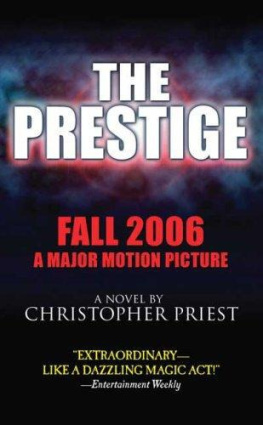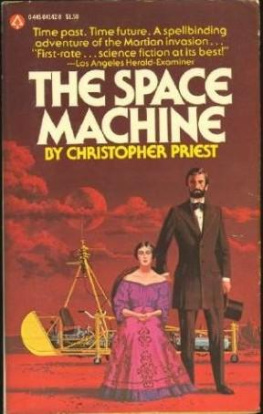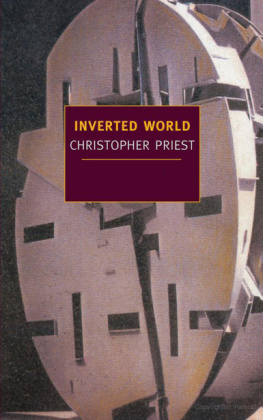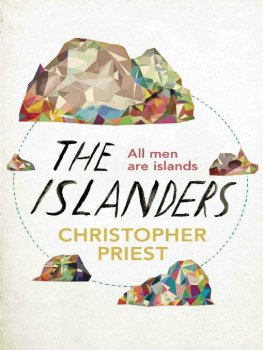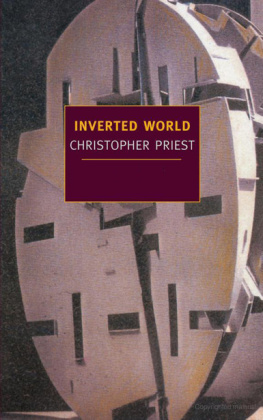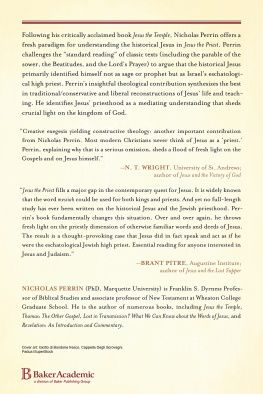Christopher Priest - The Separation
Here you can read online Christopher Priest - The Separation full text of the book (entire story) in english for free. Download pdf and epub, get meaning, cover and reviews about this ebook. year: 0101, genre: Science fiction. Description of the work, (preface) as well as reviews are available. Best literature library LitArk.com created for fans of good reading and offers a wide selection of genres:
Romance novel
Science fiction
Adventure
Detective
Science
History
Home and family
Prose
Art
Politics
Computer
Non-fiction
Religion
Business
Children
Humor
Choose a favorite category and find really read worthwhile books. Enjoy immersion in the world of imagination, feel the emotions of the characters or learn something new for yourself, make an fascinating discovery.

- Book:The Separation
- Author:
- Genre:
- Year:0101
- Rating:3 / 5
- Favourites:Add to favourites
- Your mark:
- 60
- 1
- 2
- 3
- 4
- 5
The Separation: summary, description and annotation
We offer to read an annotation, description, summary or preface (depends on what the author of the book "The Separation" wrote himself). If you haven't found the necessary information about the book — write in the comments, we will try to find it.
The Separation — read online for free the complete book (whole text) full work
Below is the text of the book, divided by pages. System saving the place of the last page read, allows you to conveniently read the book "The Separation" online for free, without having to search again every time where you left off. Put a bookmark, and you can go to the page where you finished reading at any time.
Font size:
Interval:
Bookmark:
The Separation
Christopher Priest
Part One: 1999
1
The rain was falling steadily on Buxton that Thursday afternoon in March, the town veiled by drifting low clouds, grey and discouraging. Stuart Gratton was sitting at a small table in the brightly lit bookshop window with his back to the street, but from time to time he turned to look outside at the slow-moving cars and trucks, the pedestrians splashing along with their faces averted, umbrellas low over their shoulders.
On the table before him was a glass of wine which he had almost finished drinking and next to it a half-empty half-bottle of hock. Beside the wine glass was a narrow-necked flute, with a single red rose standing upright in the water. On the table to his right was a pile of unsold copies of his most recent hardcover book, The Exhausted Rage, an oral history of the experiences of some of the men who took part in Operation Barbarossa, the German invasion of the Soviet Union in 1941. To his left, on the edge of the table, were two smaller piles of unsold copies of his books, both paperback editions reissued to coincide with the new hardcover. One of the titles was The Last Day of War, the book published in 1981 which had established his reputation and which had been in print more or less ever since. The other was called The Silver Dragons, another oral history, this one recounted by some of the soldiers and airmen who took part in the Sino-American War in the mid-1940s.
His ballpoint pen lay on the table next to his hand.
The manager of the bookshop, an attentive and clearly embarrassed man whose name Gratton remembered only as Rayner, was standing beside him when the signing session had begun, half an hour earlier, but he had been called away to attend to other business a few minutes before. Now Gratton could see him on the far side of the shop, apparently involved in some problem with the till or PC. The area manager from his publishers, who was supposed to come along to support Gratton at the signing, had called on his mobile to say there had been a traffic accident on the M1 and that he was going to be late. The bookshop, situated in a side street but close to the main department and chain-stores in the centre of Buxton, was not busy. People came in from the rain from time to time, looked curiously at him and at the poster on the wall beside him announcing his signing, but none of them seemed interested in buying any of his books. One or two of them even shied away when they realized why he was sitting there.
It had not been like this when the signing began: two or three people had been waiting for him, including a friend of his, Doug Robinson, who had magnanimously driven over from his home in Sheffield to give moral support. Doug even bought one of the paperbacks, saying he needed to replace his old, worn-out copy. Gratton gratefully signed that, as well as the copies requested by the other customers, but now all of them were gone. By arrangement, Doug would be waiting for him in the bar of The Thistle, two doors down from the bookshop. Rayner, the manager, had asked him to sign some extra copies, a few for stock, and three or four more for mail-order customers who had ordered the books in advance, but in effect that was that. Somewhere, somehow, people must be buying his books because his work attracted consistently good sales and in his field Gratton was considered a leading author. However, few of his readers appeared to be in Buxton during that afternoon of dismal rain.
Gratton was regretting having agreed once again to a signing session. He had undertaken similar stints in the past, so he should have known what was likely to happen. What made this one worse was the fact that he had cut short a research trip abroad to be home in time for the appointment. He was jetlagged from the long flight across the Atlantic, he was also tired from lack of sleep overnight and he was feeling oppressed by the backlog of work which had accumulated while he was away. In his introspective mood he suddenly remembered his wife Wendy, who had died two years before. Wendy liked this shop and used to buy most of her books here. He had hardly been back since her death. There had been obvious changes in the meantime: new shelving and cabinets, brighter lighting, a few tables and chairs where customers could sit and read.
Still with more than twenty minutes to go before the signing session was officially at an end, Gratton saw a woman coming into the shop from the street, a large padded envelope under her arm. She looked quickly around the shop, spotted him sitting at his table and walked across to him. For a moment they stared at each other. Her hair and coat, and the padded envelope, were rain-damp. There was a fleeting illusory sense that he had seen her before, that they had met somewhere.
Id like to buy one of these, please, she said, reaching forward to select a paperback of The Last Day of War. Droplets of water fell on the table. Do I pay for it here?"
No, you have to take it to the till, Gratton said, pleasantly surprised to be doing something at last. Would you like me to sign it for you?
Yes, please. You are Stuart Gratton, arent you?
I am, he said, opening the cover and beginning to inscribe the title page.
My father was one of your most avid readers before he died," she said in a rush, while he was still signing. He thought you were doing important work, recording those experiences.
Would you like me to dedicate the book to you? With your name?
No . . . just sign it, please. She turned her head to see what he was writing, then said, It was about my father, actually. Coming here to see you. She nodded towards the poster on the wall next to him. I was in this shop the other day and I found out youd be here. I only live in Bakewell, so it was too good an opportunity to miss.
Gratton finished inscribing the book by writing in the date. He handed the copy back to the woman. Many thanks, he said.
Dad was in the war too, she said, still speaking quickly. He wrote down his experiences in notebooks and I wondered if you might be interested . . . ? She indicated the padded envelope she was carrying.
I wouldnt be able to get them published for you, Gratton said.
Its not that. I thought you might be interested to read them. I saw your advertisement.
Where was that?
An old wartime colleague of Dads sent it to me. Hed spotted it in a magazine called RAF Flypast.
Your father wasnt called Sawyer, was he?
Yes, he was. Im a Sawyer. Thats my maiden name. I saw your ad and I thought that Dads notebooks might be what youre looking for.
And he was in Bomber Command during the war?
Yes, thats the point. She pushed the large envelope towards him. Look, I have to tell you that I havent read Dads notebooks myself. Ive never been able to decipher his handwriting. He didnt say much about them but he spent hours in his room, writing away. He retired ages ago, lived on his own for years, but towards the end he moved in with me and my husband. He was with us for the last two and a half years of his life. He was always scribbling away in his notebooks. I never really paid much attention, because it was keeping him out of my hair. Maybe youve had a similar experience . . . ?
No. Nothing like that. Both my parents died some years ago.
Well, Dad told me once that hed put down everything in writing, his whole life, his time in the air force, everything he did. Thats the other problem for me. Most of what he wrote about is the war, which Ive never found interesting. But then I was sent your ad - so, well, here I am.
Gratton regarded the damp padded envelope lying on the tabletop.
These are the originals? he said.
Font size:
Interval:
Bookmark:
Similar books «The Separation»
Look at similar books to The Separation. We have selected literature similar in name and meaning in the hope of providing readers with more options to find new, interesting, not yet read works.
Discussion, reviews of the book The Separation and just readers' own opinions. Leave your comments, write what you think about the work, its meaning or the main characters. Specify what exactly you liked and what you didn't like, and why you think so.

